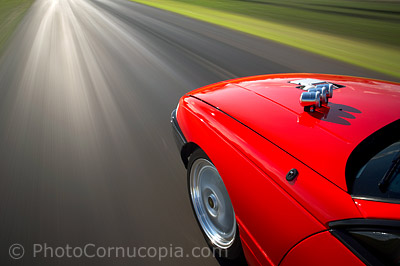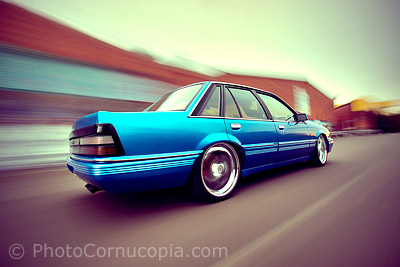|
Topic: |
Rig
Shots 1: What is a 'rig
shot' ? |
|
Author/Copyright: |
John Jovic |
A
'rig
shot' is
an image where the camera has been attached somehow to the subject,
usually a
car, to enable a much longer exposure of the subject than would be
possible otherwise. This gives an image with much more background
movement/blur than would be possible using techniques such as 'panning'
(where you shoot a moving car from a fixed position) or
'tracking shots' (where you shoot the subject from another car moving at
the same speed).
In a 'rig shot' the car and camera move in unison.
Even though the car may move a
relatively long distance during an exposure, and usually at a very slow speed, the camera sees the car as
being absolutely stationary
within the image it is recording because they are attached together and effectively one.
The exposures are often several seconds long, even in bright daylight where
the light intensity is often tempered with Neutral Density (ND) filters.
They are usually shot at walking pace or slower as the sense of speed is
created by the length of the exposure and how far the car travels during
the exposure, not the speed of the car.
 |
|
 |
|
Partial rig shot. |
|
Full Car rig shot. |
You won't find the term
'rig shot'
in the Oxford dictionary
any time soon. The term 'rig shot' seems to have developed organically
throughout the world of still photography as it has always been awkward
to articulately describe the apparatus attached to the car. It's not a 'tripod and suction
cup shot', or an 'aluminium tube and various ancillary fasteners
shot'! Simply calling it a 'rig' always seemed to be a good fit
and many people seemed to think the same way as the term is now commonly in use
in the UK, Europe and US. The term
'bolt-on shot' is sometimes
used in the UK.

